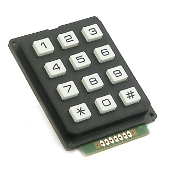 No more fumbling with your mobile phone's or i-Pod's tiny touchpads -- you can now have a keypad on your forearm, just by combining acoustic sensors and a mini -projector, say scientists.
No more fumbling with your mobile phone's or i-Pod's tiny touchpads -- you can now have a keypad on your forearm, just by combining acoustic sensors and a mini -projector, say scientists.
An international team has come up with such a system, called 'Skinput', which has the ability to detect the ultralow -frequency sound produced by tapping the skin with a finger, and microchip-sized projectors now found in some cellphones, the New Scientist reported.
According to the scientists, the system beams a menu or keyboard onto the user's forearm and hand from a projector housed in an armband.
An acoustic detector, in the armband, then calculates which part of the display to be activated. But how does the system know which icon, button or finger the user tapped?
Well, for this, the scientists have identified various locations on the forearm and hand that produce characteristic acoustic patterns when tapped.
The acoustic detector in the armband contains five piezoelectric cantilevers, each weighted to respond to certain bands of sound frequencies.
Different combinations of sensors are activated to differing degrees depending on where the arm is tapped, say the scientists.
Twenty volunteers tested the system and most found it easy to navigate through icons on the forearm and tap fingers to actuate commands.
The subjects were able to deftly scroll through menus whether they moved up and down or flicked across their arm, according to the team.
"Skinput works very well for a series of gestures, even when the body is in motion," Chris Harrison at Carnegie Mellon University, who led the team, was quoted as saying.
The new gadget has evoked a mixed response.
Pranav Mistry of the Media Lab at the Massachusetts Institute of Technology has warned that users will have to position the armband very precisely so the projection always appears in the right place.
Nevertheless, Skinput looks a promising idea, said Michael Liebschner, the director of the Bio-Innovations Lab at Baylor College of Medicine in Houston.
"This sounds a very feasible approach to using the body as an input device." Harrison, along with with Dan Morris and Desney Tan at Microsoft's research laboratory in Redmond, will present their work at Computer-Human Interaction meet in Atlanta in April.









 © 2025
© 2025